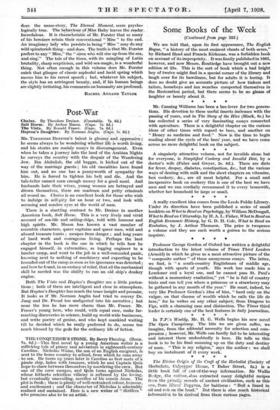Post-War
MR. THEODORE DREISER'S talent is gloomy and_oppressiye ; he seems always to be wondering whether life is worth living, and his stories are mainly essays in discouragement. Even
when he takes a journey into the land of the Arabian Nights he surveys the country with the despair of the Wandering
JeW. Ibn Abdullah, the old beggar, is kicked out of the way of- the marriage guests ; his old -rasealities have found him out, and no one has a pennyworth of sympathy for him. He is forced to tighten his belt and die. And the
tale-teller cannot earn enough money for a good meal. And husbands hate their wives, young women are betrayed and &own themselves, there are madmen and petty criminals all round us. Chains is an excellent book for those who wish to indulge in self-pity for an hour or two, and look with accusing and sombre eyes at the world of men.
There is a startling contrast to Mr. Dreiser in another American book, Salt Horse. This is a very lively and vivid account of sea-life and sailing-ships, told with humour and high spirits. Mr. Mason has known a vast number of eccentric characters, queer captains and queer men, wild and absurd treasure hunts ; escapes from danger ; and long years of hard. work and courageous living. Perhaps the best chapter in the book is the one in which he tells how he engaged himself, - in extremities: as logging engineer to a lumber camp, and went to the job in a well-coutealed panic, knowing next to nothing of machinery and expecting to be hounded out of the camp as soon as his ignorance was detected ; and how he found, in an ecstasy of relief, thatall the mechanical skill he needed was the ability to run an old ship's donkey engine.
Both The Vista and Hapton's Daughter are a little preten- tious ; both of them are intelligent and close in atmosphere.
But Hapton's Daughter has much the truer insight and promise. It looks as if Mr. Norman Anglin -had tried to convey Dr. Jong and Dr. Freud too undigested -into his narrative ; but
none the less he has more charm than Mr. Fraser. Mr. Fraser's young hero, who could, with equal ease, make far- reaching discoveries in science, build up world-wide businesses, and write poetry of genius, and who kept mankind waiting till he decided which he really preferred to do, seems too much blessed by the gods for the ordinary life of fiction.






































 Previous page
Previous page